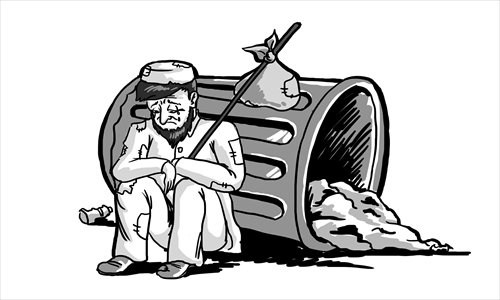Finding a new home for Rohingyas

Aung San Suu Kyi, leader of Myanmar's National League for Democracy, is visiting the US now but her trip has come under domestic criticism as she failed to speak up for nearly 800,000 Rohingya Muslims living in the country.
Since May of this year, Myanmar has witnessed an escalation of simmering tensions between two different groups of people in Rakhine state. The violence between the Rakhines (Arakans) and Rohingyas has led to the deaths of 88 people, as of August 22, and the displacement of thousands of others. Unofficial reports, however, put the death toll in the hundreds.
The immediate cause of the violence was a consequence of the rape and murder of a Buddhist-Arakan woman on May 28 by some Rohingyas. This was followed by the retaliatory killing of 10 Rohingyas by ethnic Rakhines on June 3. It must be noted that the tensions between these two groups have existed for the past several decades.
Questions have been asked as to why little has been done to resolve the conflict and if there is a possibility of a permanent solution. Much blame has been targeted squarely at both the Myanmese government and the opposition.
As the international community is promoting various national interests in this fledgling democracy, sectarian violence such as this has not been given serious attention, especially by the Western powers.
While Human Rights Watch criticized the Myanmese government for failing to prevent the initial unrest, nations such as Indonesia, Egypt, Saudi Arabia, Pakistan and Malaysia criticized alleged discrimination toward the Rohingya Muslims because of their religious beliefs.
The sensitivity of the issue has silenced many from discussing it publicly.
Even Suu Kyi, the internationally acclaimed human rights champion, has made only brief comments by emphasizing the need for establishing a proper citizenship law to address the problem.
The root of the problem begins with the nomenclature itself. Although they call themselves Rohingyas, the Myanmese government calls them illegal Bengali migrants from neighboring Bangladesh.
Since the governments of Myanmar and Bangladesh have both refused to accept them as citizens, the Rohingyas automatically became stateless people under international law.
Myanmar President Thein Sein suggested that the United Nations Refugee Agency should consider resettling the Rohingyas to other countries. Although such a proposal may sound ideal, there are challenges to its implementation.
For example, will there be nations willing to welcome and embrace about 1 million Rohingyas? Moreover, the United Nations High Commissioner for Refugees (UNHCR) Chief, Antonio Guterres, has rejected the idea of resettlement. Even if the agency reconsiders the case, do the UNHCR offices in Myanmar and Bangladesh have adequate resources to process such a large number of refugees?
One possible solution for the governments of Myanmar and Bangladesh is to reach an amicable arrangement to integrate the Rohingya population into their respective societies. Currently, there are approximately 800,000 Rohingyas inside Myanmar and another 300,000 of them in Bangladesh.
Similar to the first, this proposition has its own challenges. Will the indigenous Rakhines accept Rohingyas as their fellow citizens and live peacefully alongside them? Will the Bangladesh government be willing to offer citizenship to the Rohingyas, which it presently denies?
Another possible solution is that Myanmar could amend its 1982 citizenship law to pave the way for the Rohingyas to apply for citizenship. In addition, Myanmar and Bangladesh need to secure their porous international borders to prevent illegal movements.
None of the above suggested policies are simple and easy to achieve. Despite the challenges and difficulties, the problem of the Rohingyas cannot be ignored for too long. Without addressing the crux of the issue, the May incident could possibly be one of a series of events that will trigger greater consequences.
Before a solution is achieved, international institutions such as the UN and the ASEAN must put pressure on the Myanmese government to resolve the problem. The conundrum needs to be addressed holistically rather than inciting hatred along religious or racial divides.
The author is a researcher on policies of South and Southeast Asia, especially Myanmar, and general secretary of the US-based Kuki International Forum. opinion@globaltimes.com.cn